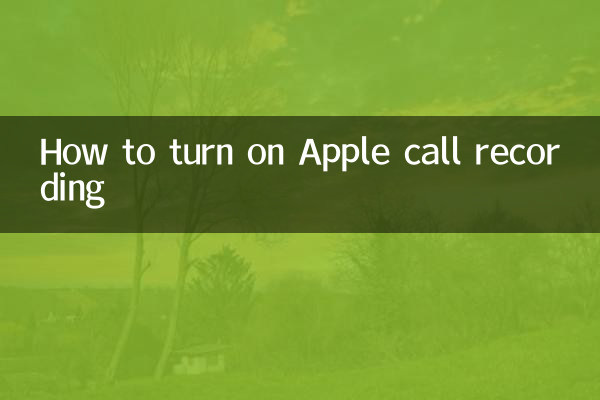How to turn on Apple call recording
In recent years, with the continuous enrichment of smartphone functions, call recording has become one of the functions that many users pay attention to. However, due to system limitations and privacy policies, Apple mobile phones (iPhone) do not natively support the call recording function. This article will focus on this hot topic and combine it with hot discussions on the entire Internet in the past 10 days to provide a detailed analysis of the current situation, alternatives, and related laws and regulations of Apple mobile phone call recording.
1. Why doesn’t Apple phone support call recording?

Due to privacy protection and legal compliance considerations, Apple does not have a built-in call recording function in the iOS system. Here are the main reasons:
| reason | Detailed description |
|---|---|
| Privacy protection | Apple emphasizes user privacy, and call recording may involve the risk of leaking the privacy of others. |
| legal restrictions | Some countries and regions (such as some states in the United States and Europe) require the consent of both parties for call recording. |
| System design | The iOS system is highly closed, making it difficult for third-party applications to directly call the call recording function. |
2. Alternative solutions for call recording on Apple mobile phones
Although not natively supported, users can still implement the call recording function in the following ways:
| plan | Operation steps | Advantages and Disadvantages |
|---|---|---|
| External recording equipment | Use another device (such as an Android phone, voice recorder) to record the call. | Advantages: simple and straightforward; disadvantages: additional equipment required. |
| Third-party call recording applications | Download apps like TapeACall, Rev Call Recorder and more. | Advantages: Easy to operate; Disadvantages: It requires payment, and the recording quality may be unstable. |
| Carrier services | Some operators provide call recording services, please consult your local operator. | Advantages: High compliance; Disadvantages: Services may be limited. |
3. Legal risks and precautions of call recording
When using the call recording function, users should pay attention to the following legal and ethical issues:
| area | legal requirements | Things to note |
|---|---|---|
| USA | Some states require mutual consent (such as California), and some only require one-party consent. | Need to know local laws in advance. |
| Europe | GDPR strictly restricts recording activities and usually requires explicit consent from both parties. | You need to inform the other party before recording. |
| China | Not expressly prohibited by law, but recordings must be used for legal purposes. | Avoid use for illegal purposes. |
4. Users’ attitudes towards Apple’s call recording function
In the hot discussion on the Internet in the past 10 days, users' attitudes towards Apple's failure to open the call recording function have become polarized:
1.supporter: I believe Apple’s stance on protecting privacy deserves recognition and avoids legal disputes.
2.opposition: It is believed that the lack of functions affects the user experience, especially in business scenarios.
The following are typical comments from some netizens:
-@Technology Enthusiasts: “Apple does a good job of privacy protection, but hopes to provide compliant call recording options in the future.”
-@business people: “It’s too inconvenient to not have call recording. Every important call has to be recorded with other devices.”
5. Future Outlook
As user demand grows and technology develops, Apple may make adjustments in the following areas:
1.Regional functions open: Provide call recording function in areas permitted by laws and regulations.
2.Third-party API support: Open some interfaces to allow compliant third-party applications to implement recording functions.
3.Cloud recording service: Cooperate with operators to provide encrypted cloud recording services.
Summarize
Apple phones currently cannot directly turn on the call recording function, but users can achieve similar needs through external devices, third-party applications or operator services. When using it, be sure to pay attention to local laws and regulations to avoid infringing on other people's privacy. In the future, with technological development and policy adjustments, Apple may gradually improve this function.

check the details

check the details